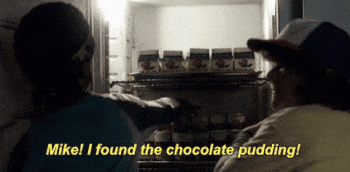While people often talk about the fun side of student life – the travel opportunities, meeting new friends and having new experiences – we often forget how tough it can be. Completing a degree is difficult! Plus, with every exam and assignment, you know it’s all building up to the grand finale, the coup de grâce, the final stage boss with an unlimited health bar… The dissertation.
This 10,000 word beast is almost like the Voldemort of the student world; you just don’t talk about it. But actually, you should.
My hypothesis: I can make you believe that a dissertation is not a terrifying monster that will steal your life and soul through a summary of each section in an informative, yet satirical manner. (Basically, I’m gonna guide you through the process and take the mick a bit)!
Introduction

Mood level: Nervous but hopeful.
Any good piece of writing starts with a solid intro (see above, great stuff huh?) and your dissertation is no different. You need to think of it as a family of assignments rather than one big project, and this is your first one! Your introduction should show the reader what your aims and objectives are and any hypotheses or questions you’re looking to answer.
At the same time, you’ll need to add some context to your work. If the reader has to ask, “what is this person doing?” after a few pages, you’ve missed the mark a bit. Make sure you’re clear with what you want to do and put this clarity in your intro.
The mistake a lot of people make with their dissertation is that they think they have to sound like a genius and use complicated words like ‘esoteric’ or ‘quaff’. You don’t. Keep it simple and explain yourself properly. That’s the key!
Literature Review

Mood level: Fascinated with a touch of regret.
This is where you’re going to get your historical brain in gear. Explain where your thoughts are coming from by looking at the history of your topic of choice. Where does it all originate from? Who were breakthrough researchers and theorists? And what are the different schools of thought on the matter?
You should be a history buff of whatever you’re discussing by the end of this… Even if you hate the fact that you remember the dates an old man discovered something, and deem yourself a giant nerd. But remember, the higher the level of nerd-dom, the better your lit review will be!
Methodology

Mood level: A combination of concern and relief that you’re halfway there.
The methodology is one big question; what are you going to do? You’re going to take all of your research and hypotheses into account and breakdown exactly how you’re going to find facts, make sense of them, and observe them in different contexts etc.
A lot of this kind of thing is case by case, so don’t panic if your mate who’s studying Geography’s methodology is much different to yours if you’re an English student. It has to relate to your work.
Findings and discussion

Mood level: Angry war veteran
This is the important bit! Everything leading to your findings and discussion has been like slaving away in mamma’s kitchen; picking the right spices, grabbing that Himalayan salt, stirrin’ it up, and now it’s time to put it all together!
Present your findings in the way that suits what you have written previously. Remember your findings don’t have to be ground-breaking, or even what could be described as ‘successful’, they just have to be accurate. It is the discussion where things really heat up. This is where you should observe what you have found with what’s been found before you. This is your time to have your voice heard.
Conclusion

Mood level: So close, yet so far.
Obviously, this is where you’re going to be summarising your work. There’s a tendency to rush this conclusion as it feels like all the hard work is over, however, this is still seen as a key part of your dissertation; don’t sell yourself short right at the end.
Ask yourself, what would come next? Where would my work continue to go from here? The reader may want to know more…
The stuff no one talks about

Mood level: Satisfyingly smug or dangerously unhinged.
Although the above are the main components of your dissertation, there are many things that are equally imperative to your work that often get left ’til the end.
Do not overlook the importance of your references, appendices and bibliography. (I know I said no big words, sorry). It’s unwise to leave this until the end, build these things as you go to avoid missing things out or having to rifle back through books and journals to find something.
The same can be said for your table of contents and other introductory essentials, they shouldn’t be left till the last minute. Your title should also have been well thought out before you started, often signed-off by your tutor.
Which brings me to my final point, all of this has been done before by thousands of students worldwide. It is not an impossible task designed for you to fail, and certainly not the monster coming to take your life and soul!
Your dissertation is your chance to showcase the knowledge you have gained throughout your course. It is also not something you are meant to tackle alone. You are given a dissertation tutor for a reason, take advantage of that. It is more than likely someone you have worked with already, so build that relationship, ask questions and make sure you’re on the right track.
In the end, you’ll hold it in your hand, bound and ready to go, feeling that sense of accomplishment too.







